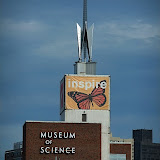 |
| Boston Museum of Science |
First, the good stuff: The museum covers every aspect of science, from biology and chemistry to physics and maths. The collection is vast, is being renewed very well and combines interactivity with curation very well. There is technology, such as the interactive fish exhibit (which links onto the internet) and lots of writing, such as in the maths section. Interestingly, this is the second museum in which I've seen a section dedicated purely to mathematics - the first was the Cité des Sciences in Paris.
The interactives were likewise excellent - we were able to do Galileo's test of gravity using a big shute, play game theory with money division and biscuits and learn about relativity by pushing a small train along a track and popping a ping-pong ball vertically over the bridge from the carriage. In the section on models, described as an excellent way to show off the miscellaneous items in stock, visitors were presented with the difficult task of creating the shape of an island from the point of view of a visiting mariner.
A new exhibition about the senses gave a fresh look at all five, and included a section on our perception of time. I was particularly impressed by an exhibit that gave a view of a water droplet at different stages of it falling from the mouth of the pipette onto a platform and off it again. This was done with a very short timed flash, that was alterable for the different stages. I also particularly liked the simple demonstration of how fast something can flash by on a screen and still be taken in by the brain.
It also has an exhibition of Escher's work and optical illusions - bigger and more three-dimensional than in books. It asked the question, "Why art at the Museum of Science?" and you can read the reasons they gave in the pictures. The museum doesn't seem afraid to cross traditional boundaries of 'subjects' in order to make its audience think, and this is the mark of good science communication.
The only criticism I can level at the museum is that for some of the older exhibits (such as the mathematics ones) there is a certain amount of knowledge needed for the pieces on display. I was fine to read them because of my mathematical background, but I was drawn to the potential for accessibility issues there. I'm not asking for them to be withdrawn or the writing to be 'dumbed down', but I feel that an entry-level step is needed in addition to provide readers with a better understanding.
My other problem that has surfaced with a number of different institutions - if you are going to provide an email address, make sure that it is monitored. I know that there will be a lot of spam, but for too many facilities I have sent emails to the addresses on the website never to hear back. This is disappointing and definitely not a good state of affairs for any centre, and does not give the best impression.
There is so much more to the Museum of Science in Boston, such as the arteries of a dog laid out in a cabinet, an exhibition on nanoscience as well as the collection of animals and the natural world. You really need a full day at least to take everything in, and there are a number of different membership options which seem to me to be very good value.



No comments:
Post a Comment